Report: Training and Development, Bargaining Strategies for Hotels
VerifiedAdded on 2020/06/04
|7
|1449
|144
Report
AI Summary
This report examines the necessity of training and development programs for hotel staff, exploring the benefits and drawbacks. It argues for the importance of practical, on-the-job training and shorter, more focused sessions to maximize employee engagement and skill development. The report also analyzes two case studies on bargaining strategies. The first case involves a female supervisor facing unfair treatment, suggesting the use of distributive bargaining to ensure equal pay and address workplace discrimination. The second case involves a room attendant facing discrimination due to sexual orientation, recommending integrative bargaining to promote the employee, provide training, and resolve conflicts effectively. The report emphasizes the importance of fair practices, employee rights, and effective conflict resolution within the hotel industry.

H R
Paraphrase This Document
Need a fresh take? Get an instant paraphrase of this document with our AI Paraphraser
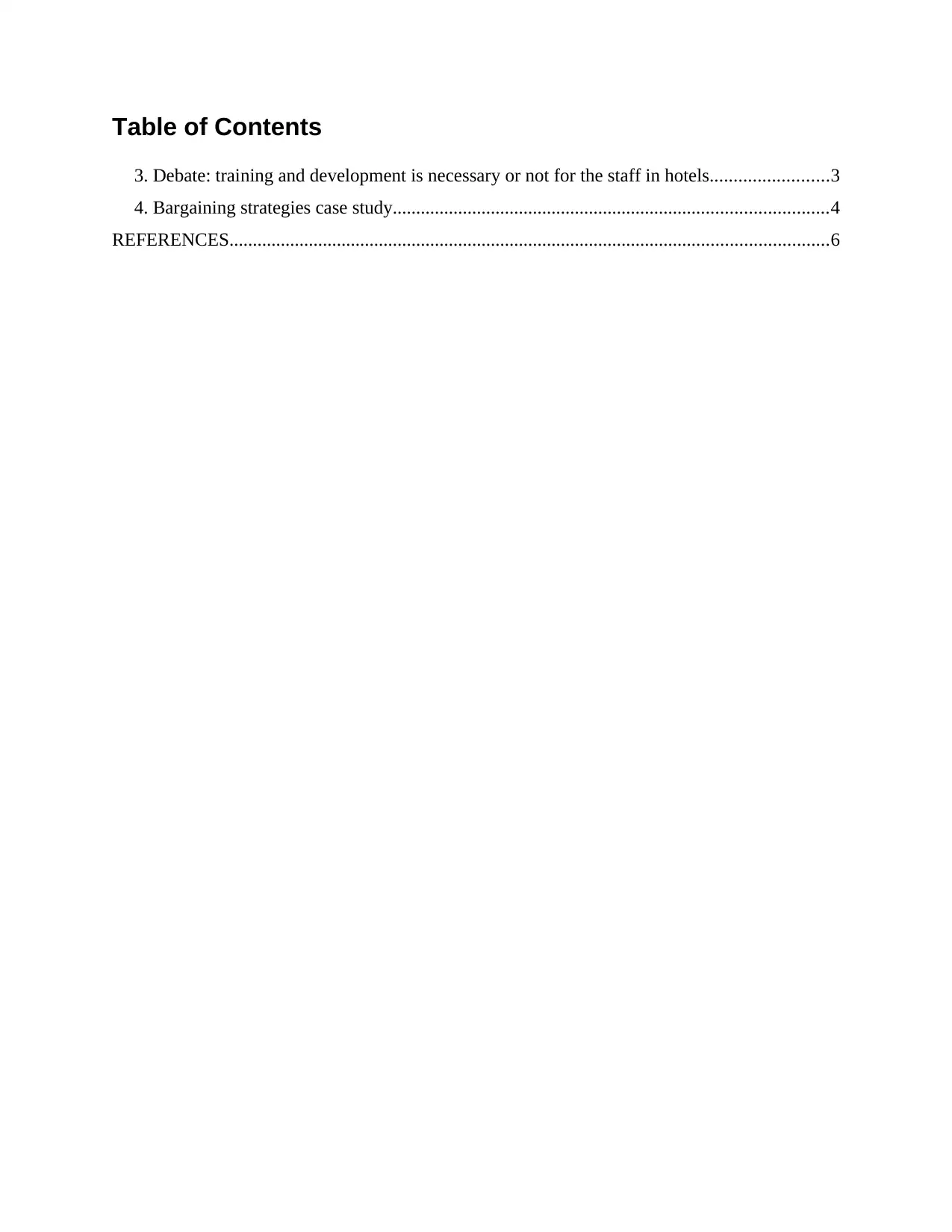
Table of Contents
3. Debate: training and development is necessary or not for the staff in hotels.........................3
4. Bargaining strategies case study.............................................................................................4
REFERENCES................................................................................................................................6
3. Debate: training and development is necessary or not for the staff in hotels.........................3
4. Bargaining strategies case study.............................................................................................4
REFERENCES................................................................................................................................6
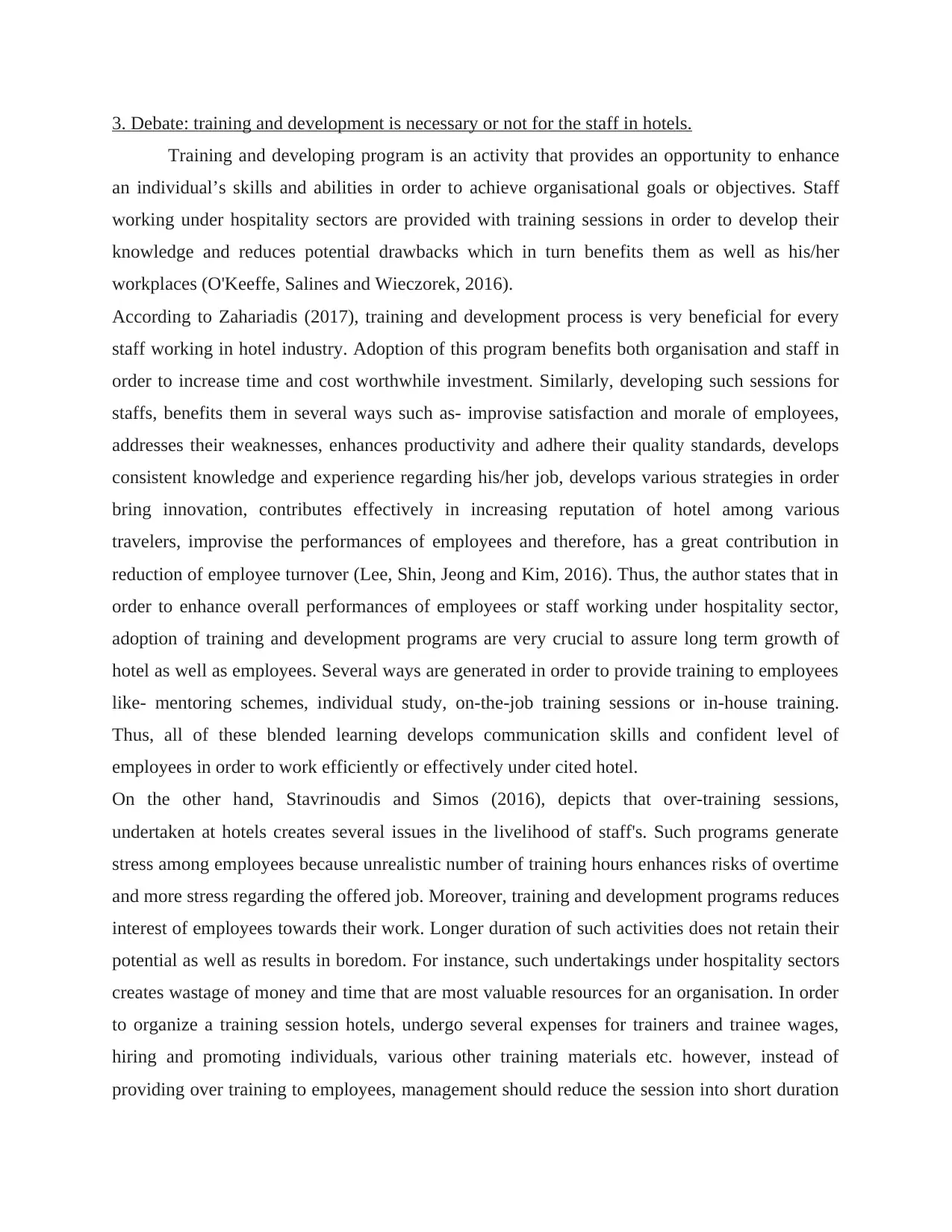
3. Debate: training and development is necessary or not for the staff in hotels.
Training and developing program is an activity that provides an opportunity to enhance
an individual’s skills and abilities in order to achieve organisational goals or objectives. Staff
working under hospitality sectors are provided with training sessions in order to develop their
knowledge and reduces potential drawbacks which in turn benefits them as well as his/her
workplaces (O'Keeffe, Salines and Wieczorek, 2016).
According to Zahariadis (2017), training and development process is very beneficial for every
staff working in hotel industry. Adoption of this program benefits both organisation and staff in
order to increase time and cost worthwhile investment. Similarly, developing such sessions for
staffs, benefits them in several ways such as- improvise satisfaction and morale of employees,
addresses their weaknesses, enhances productivity and adhere their quality standards, develops
consistent knowledge and experience regarding his/her job, develops various strategies in order
bring innovation, contributes effectively in increasing reputation of hotel among various
travelers, improvise the performances of employees and therefore, has a great contribution in
reduction of employee turnover (Lee, Shin, Jeong and Kim, 2016). Thus, the author states that in
order to enhance overall performances of employees or staff working under hospitality sector,
adoption of training and development programs are very crucial to assure long term growth of
hotel as well as employees. Several ways are generated in order to provide training to employees
like- mentoring schemes, individual study, on-the-job training sessions or in-house training.
Thus, all of these blended learning develops communication skills and confident level of
employees in order to work efficiently or effectively under cited hotel.
On the other hand, Stavrinoudis and Simos (2016), depicts that over-training sessions,
undertaken at hotels creates several issues in the livelihood of staff's. Such programs generate
stress among employees because unrealistic number of training hours enhances risks of overtime
and more stress regarding the offered job. Moreover, training and development programs reduces
interest of employees towards their work. Longer duration of such activities does not retain their
potential as well as results in boredom. For instance, such undertakings under hospitality sectors
creates wastage of money and time that are most valuable resources for an organisation. In order
to organize a training session hotels, undergo several expenses for trainers and trainee wages,
hiring and promoting individuals, various other training materials etc. however, instead of
providing over training to employees, management should reduce the session into short duration
Training and developing program is an activity that provides an opportunity to enhance
an individual’s skills and abilities in order to achieve organisational goals or objectives. Staff
working under hospitality sectors are provided with training sessions in order to develop their
knowledge and reduces potential drawbacks which in turn benefits them as well as his/her
workplaces (O'Keeffe, Salines and Wieczorek, 2016).
According to Zahariadis (2017), training and development process is very beneficial for every
staff working in hotel industry. Adoption of this program benefits both organisation and staff in
order to increase time and cost worthwhile investment. Similarly, developing such sessions for
staffs, benefits them in several ways such as- improvise satisfaction and morale of employees,
addresses their weaknesses, enhances productivity and adhere their quality standards, develops
consistent knowledge and experience regarding his/her job, develops various strategies in order
bring innovation, contributes effectively in increasing reputation of hotel among various
travelers, improvise the performances of employees and therefore, has a great contribution in
reduction of employee turnover (Lee, Shin, Jeong and Kim, 2016). Thus, the author states that in
order to enhance overall performances of employees or staff working under hospitality sector,
adoption of training and development programs are very crucial to assure long term growth of
hotel as well as employees. Several ways are generated in order to provide training to employees
like- mentoring schemes, individual study, on-the-job training sessions or in-house training.
Thus, all of these blended learning develops communication skills and confident level of
employees in order to work efficiently or effectively under cited hotel.
On the other hand, Stavrinoudis and Simos (2016), depicts that over-training sessions,
undertaken at hotels creates several issues in the livelihood of staff's. Such programs generate
stress among employees because unrealistic number of training hours enhances risks of overtime
and more stress regarding the offered job. Moreover, training and development programs reduces
interest of employees towards their work. Longer duration of such activities does not retain their
potential as well as results in boredom. For instance, such undertakings under hospitality sectors
creates wastage of money and time that are most valuable resources for an organisation. In order
to organize a training session hotels, undergo several expenses for trainers and trainee wages,
hiring and promoting individuals, various other training materials etc. however, instead of
providing over training to employees, management should reduce the session into short duration
⊘ This is a preview!⊘
Do you want full access?
Subscribe today to unlock all pages.

Trusted by 1+ million students worldwide
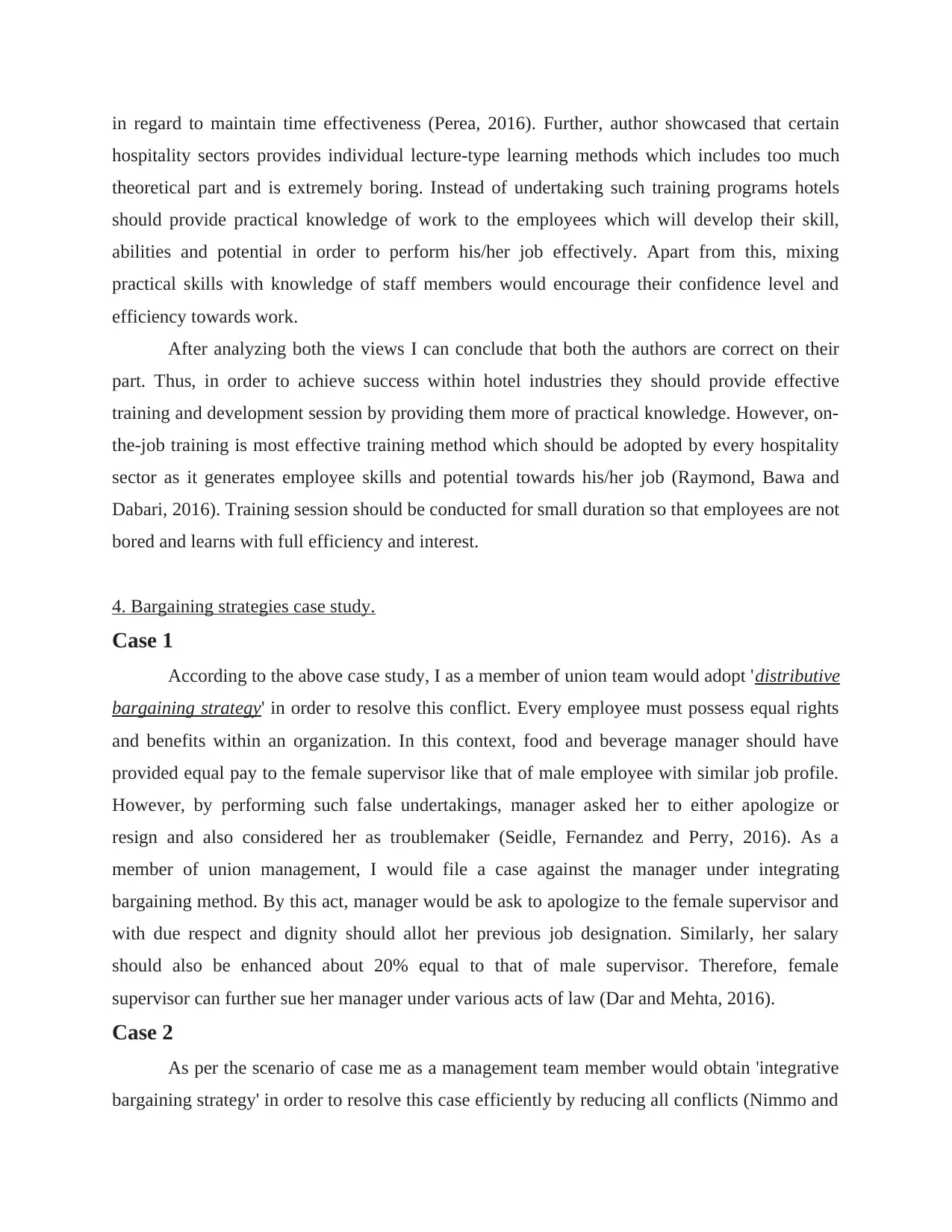
in regard to maintain time effectiveness (Perea, 2016). Further, author showcased that certain
hospitality sectors provides individual lecture-type learning methods which includes too much
theoretical part and is extremely boring. Instead of undertaking such training programs hotels
should provide practical knowledge of work to the employees which will develop their skill,
abilities and potential in order to perform his/her job effectively. Apart from this, mixing
practical skills with knowledge of staff members would encourage their confidence level and
efficiency towards work.
After analyzing both the views I can conclude that both the authors are correct on their
part. Thus, in order to achieve success within hotel industries they should provide effective
training and development session by providing them more of practical knowledge. However, on-
the-job training is most effective training method which should be adopted by every hospitality
sector as it generates employee skills and potential towards his/her job (Raymond, Bawa and
Dabari, 2016). Training session should be conducted for small duration so that employees are not
bored and learns with full efficiency and interest.
4. Bargaining strategies case study.
Case 1
According to the above case study, I as a member of union team would adopt 'distributive
bargaining strategy' in order to resolve this conflict. Every employee must possess equal rights
and benefits within an organization. In this context, food and beverage manager should have
provided equal pay to the female supervisor like that of male employee with similar job profile.
However, by performing such false undertakings, manager asked her to either apologize or
resign and also considered her as troublemaker (Seidle, Fernandez and Perry, 2016). As a
member of union management, I would file a case against the manager under integrating
bargaining method. By this act, manager would be ask to apologize to the female supervisor and
with due respect and dignity should allot her previous job designation. Similarly, her salary
should also be enhanced about 20% equal to that of male supervisor. Therefore, female
supervisor can further sue her manager under various acts of law (Dar and Mehta, 2016).
Case 2
As per the scenario of case me as a management team member would obtain 'integrative
bargaining strategy' in order to resolve this case efficiently by reducing all conflicts (Nimmo and
hospitality sectors provides individual lecture-type learning methods which includes too much
theoretical part and is extremely boring. Instead of undertaking such training programs hotels
should provide practical knowledge of work to the employees which will develop their skill,
abilities and potential in order to perform his/her job effectively. Apart from this, mixing
practical skills with knowledge of staff members would encourage their confidence level and
efficiency towards work.
After analyzing both the views I can conclude that both the authors are correct on their
part. Thus, in order to achieve success within hotel industries they should provide effective
training and development session by providing them more of practical knowledge. However, on-
the-job training is most effective training method which should be adopted by every hospitality
sector as it generates employee skills and potential towards his/her job (Raymond, Bawa and
Dabari, 2016). Training session should be conducted for small duration so that employees are not
bored and learns with full efficiency and interest.
4. Bargaining strategies case study.
Case 1
According to the above case study, I as a member of union team would adopt 'distributive
bargaining strategy' in order to resolve this conflict. Every employee must possess equal rights
and benefits within an organization. In this context, food and beverage manager should have
provided equal pay to the female supervisor like that of male employee with similar job profile.
However, by performing such false undertakings, manager asked her to either apologize or
resign and also considered her as troublemaker (Seidle, Fernandez and Perry, 2016). As a
member of union management, I would file a case against the manager under integrating
bargaining method. By this act, manager would be ask to apologize to the female supervisor and
with due respect and dignity should allot her previous job designation. Similarly, her salary
should also be enhanced about 20% equal to that of male supervisor. Therefore, female
supervisor can further sue her manager under various acts of law (Dar and Mehta, 2016).
Case 2
As per the scenario of case me as a management team member would obtain 'integrative
bargaining strategy' in order to resolve this case efficiently by reducing all conflicts (Nimmo and
Paraphrase This Document
Need a fresh take? Get an instant paraphrase of this document with our AI Paraphraser
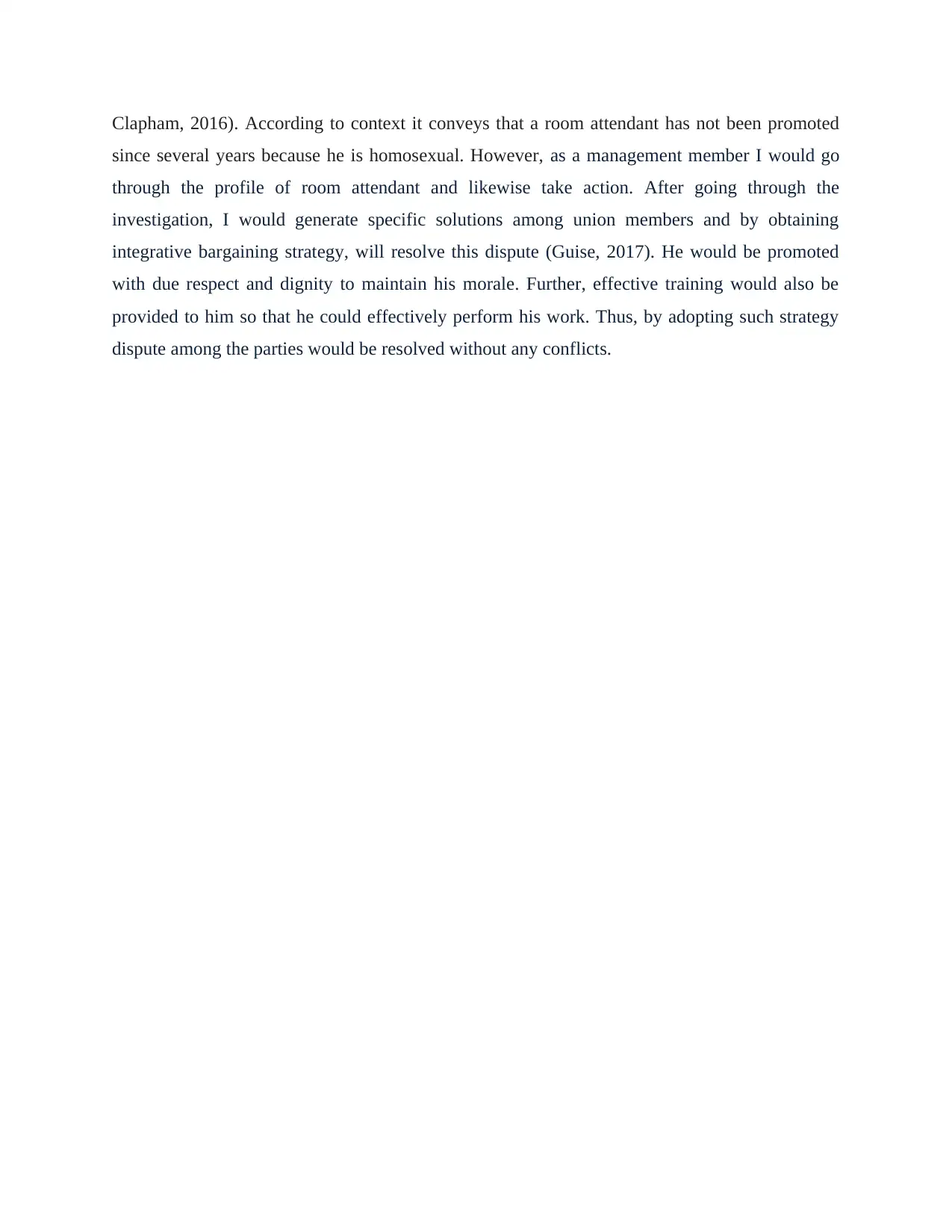
Clapham, 2016). According to context it conveys that a room attendant has not been promoted
since several years because he is homosexual. However, as a management member I would go
through the profile of room attendant and likewise take action. After going through the
investigation, I would generate specific solutions among union members and by obtaining
integrative bargaining strategy, will resolve this dispute (Guise, 2017). He would be promoted
with due respect and dignity to maintain his morale. Further, effective training would also be
provided to him so that he could effectively perform his work. Thus, by adopting such strategy
dispute among the parties would be resolved without any conflicts.
since several years because he is homosexual. However, as a management member I would go
through the profile of room attendant and likewise take action. After going through the
investigation, I would generate specific solutions among union members and by obtaining
integrative bargaining strategy, will resolve this dispute (Guise, 2017). He would be promoted
with due respect and dignity to maintain his morale. Further, effective training would also be
provided to him so that he could effectively perform his work. Thus, by adopting such strategy
dispute among the parties would be resolved without any conflicts.
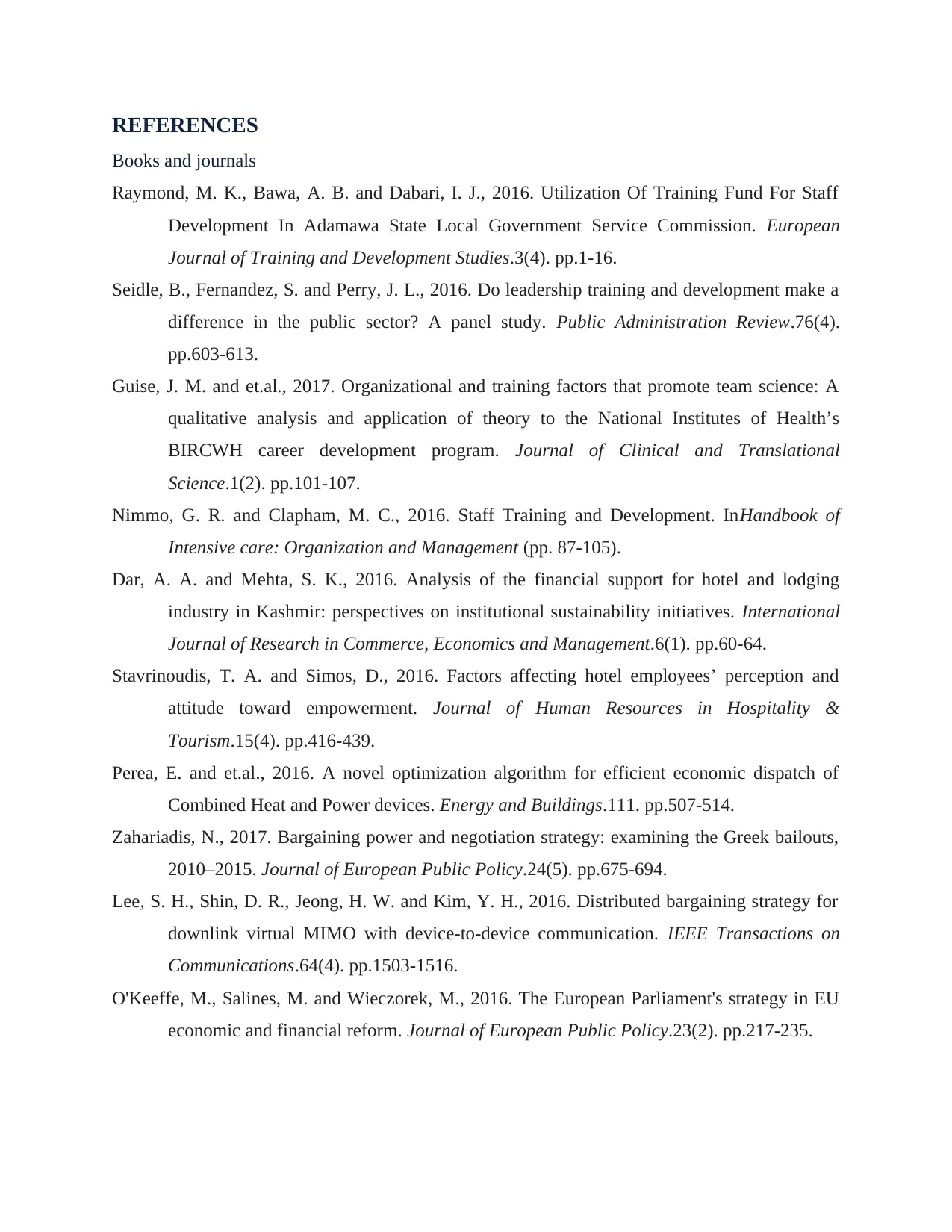
REFERENCES
Books and journals
Raymond, M. K., Bawa, A. B. and Dabari, I. J., 2016. Utilization Of Training Fund For Staff
Development In Adamawa State Local Government Service Commission. European
Journal of Training and Development Studies.3(4). pp.1-16.
Seidle, B., Fernandez, S. and Perry, J. L., 2016. Do leadership training and development make a
difference in the public sector? A panel study. Public Administration Review.76(4).
pp.603-613.
Guise, J. M. and et.al., 2017. Organizational and training factors that promote team science: A
qualitative analysis and application of theory to the National Institutes of Health’s
BIRCWH career development program. Journal of Clinical and Translational
Science.1(2). pp.101-107.
Nimmo, G. R. and Clapham, M. C., 2016. Staff Training and Development. InHandbook of
Intensive care: Organization and Management (pp. 87-105).
Dar, A. A. and Mehta, S. K., 2016. Analysis of the financial support for hotel and lodging
industry in Kashmir: perspectives on institutional sustainability initiatives. International
Journal of Research in Commerce, Economics and Management.6(1). pp.60-64.
Stavrinoudis, T. A. and Simos, D., 2016. Factors affecting hotel employees’ perception and
attitude toward empowerment. Journal of Human Resources in Hospitality &
Tourism.15(4). pp.416-439.
Perea, E. and et.al., 2016. A novel optimization algorithm for efficient economic dispatch of
Combined Heat and Power devices. Energy and Buildings.111. pp.507-514.
Zahariadis, N., 2017. Bargaining power and negotiation strategy: examining the Greek bailouts,
2010–2015. Journal of European Public Policy.24(5). pp.675-694.
Lee, S. H., Shin, D. R., Jeong, H. W. and Kim, Y. H., 2016. Distributed bargaining strategy for
downlink virtual MIMO with device-to-device communication. IEEE Transactions on
Communications.64(4). pp.1503-1516.
O'Keeffe, M., Salines, M. and Wieczorek, M., 2016. The European Parliament's strategy in EU
economic and financial reform. Journal of European Public Policy.23(2). pp.217-235.
Books and journals
Raymond, M. K., Bawa, A. B. and Dabari, I. J., 2016. Utilization Of Training Fund For Staff
Development In Adamawa State Local Government Service Commission. European
Journal of Training and Development Studies.3(4). pp.1-16.
Seidle, B., Fernandez, S. and Perry, J. L., 2016. Do leadership training and development make a
difference in the public sector? A panel study. Public Administration Review.76(4).
pp.603-613.
Guise, J. M. and et.al., 2017. Organizational and training factors that promote team science: A
qualitative analysis and application of theory to the National Institutes of Health’s
BIRCWH career development program. Journal of Clinical and Translational
Science.1(2). pp.101-107.
Nimmo, G. R. and Clapham, M. C., 2016. Staff Training and Development. InHandbook of
Intensive care: Organization and Management (pp. 87-105).
Dar, A. A. and Mehta, S. K., 2016. Analysis of the financial support for hotel and lodging
industry in Kashmir: perspectives on institutional sustainability initiatives. International
Journal of Research in Commerce, Economics and Management.6(1). pp.60-64.
Stavrinoudis, T. A. and Simos, D., 2016. Factors affecting hotel employees’ perception and
attitude toward empowerment. Journal of Human Resources in Hospitality &
Tourism.15(4). pp.416-439.
Perea, E. and et.al., 2016. A novel optimization algorithm for efficient economic dispatch of
Combined Heat and Power devices. Energy and Buildings.111. pp.507-514.
Zahariadis, N., 2017. Bargaining power and negotiation strategy: examining the Greek bailouts,
2010–2015. Journal of European Public Policy.24(5). pp.675-694.
Lee, S. H., Shin, D. R., Jeong, H. W. and Kim, Y. H., 2016. Distributed bargaining strategy for
downlink virtual MIMO with device-to-device communication. IEEE Transactions on
Communications.64(4). pp.1503-1516.
O'Keeffe, M., Salines, M. and Wieczorek, M., 2016. The European Parliament's strategy in EU
economic and financial reform. Journal of European Public Policy.23(2). pp.217-235.
⊘ This is a preview!⊘
Do you want full access?
Subscribe today to unlock all pages.

Trusted by 1+ million students worldwide

1 out of 7
Related Documents
Your All-in-One AI-Powered Toolkit for Academic Success.
+13062052269
info@desklib.com
Available 24*7 on WhatsApp / Email
![[object Object]](/_next/static/media/star-bottom.7253800d.svg)
Unlock your academic potential
Copyright © 2020–2026 A2Z Services. All Rights Reserved. Developed and managed by ZUCOL.





